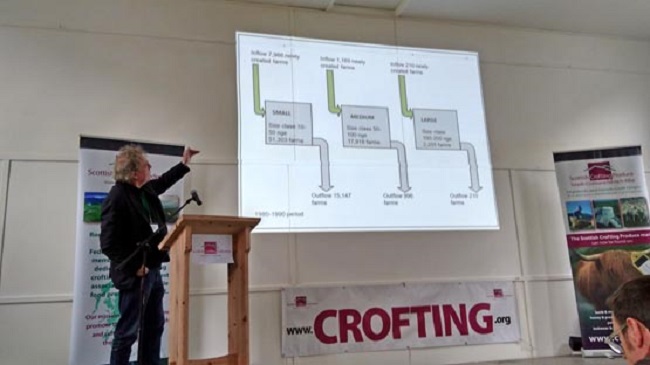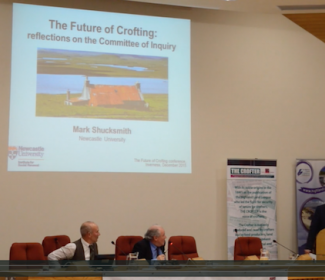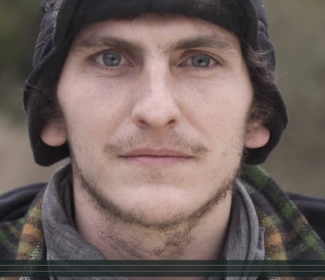Crofters gather to discuss ‘Crofting's place in Europe’

In this event report, Chief Executive of the Scottish Crofting Federation Patrick Krause tells us about their Annual Gathering 2017.
Around 90 delegates, the vast majority crofters travelling from Highland, Skye, Shetland, Lewis, Grimsay, and the Uists gathered in the remote township of Applecross from Friday 10 March to Saturday 11 March 2017. They were there to hear talks and to discuss what is important for crofting in the upcoming Brexit negotiations.
Cabinet Secretary Fergus Ewing opened the event with a reminder of the commitments made to crofting in the SNP manifesto. He went on to promise more money for the Croft House Grant Scheme and emphasised the importance of 're-peopling' the Highlands and Islands, rather than ‘re-wilding’ them. He suggested that the planning system was perhaps a blockage to re-peopling, when is should be an enabler. He urged crofters to "inundate (him) with complaints" should they be finding this to be so. He added that the agricultural support system could help new entrants more by moving money from Basic Payments to a new entrant scheme in the Scottish Rural Development Programme. He concluded by saying that crofting law was to be reformed in the lifetime of this government but that it needed to be taken carefully and collaboratively for it to be enduring.
Jan Douwe van der Ploeg, Professor Emeritus at Wageningen Agricultural University in The Netherlands and author of the book 'The New Peasantries', presented data from long-term research into the diversity of farming styles. The take-home message was that small-scale producers should not be seen as failed large farmers but as a productive force in itself, the sustainable future. Their 'farming economically' creates resilience and is the motor of their persistence.
The next two speakers tackled the nitty-gritty of current payments schemes in depth. For Pillar Two, Gwyn Jones, of European Forum for Nature Conservation and Pastoralism, laid out the current mismatch between agri-environmental schemes, policy and implementation. Senior policy advisor with SRUC Steven Thomson under the apt title Crofting by Numbers presented Basic Farm Payment data for every crofting county, showing wide variety.
The talk by Samuel Féret "Is the CAP reformable towards 2020?" looked at lessons learnt from the 2013 CAP design, negotiation and implementation.
The event aimed to strengthen partnerships across Europe. The European Coordination of la Via Campesina (ECVC) was represented by Dutch farmer Hanny van Geel who stressed the importance of working together rather than separately - she used the graphic metaphor of an open hand risking fingers getting broken whereas fingers together form a fist which has the power to strike back.
Robin Calvert gave the ‘Voice from the Fank’ the views of a crofter. Robin and his wife Penny run the 44 hectare croft Reidchalmai at Rogart. They have a fold of Highland cattle and buy-in lambs to sell on as gimmers. They also have free-range pigs and poultry, hay and some roots, and sell meat directly through their own company. Robin felt that the CAP system does not work – it being biased to large industrial units, giving more to those that already have a lot – "we are being taken for a ride". He emphasised that schemes need to be accessable to small producers, which they are not at present, and that bureaucracy must be appropriate to size. He made a plea for crofters to beat the drum louder for croft produced meat.
'Brexit Minister' Michael Russell, lead negotiator for Scotland, gave an incisive talk unfolding in detail the three options facing Scotland as regards Brexit: 1. we go along with UK government making all the decisions on Brexit; 2. Scotland remains in the European single market and the UK as outlined in the ‘Scotland's Place in Europe’ paper or 3. Scotland remains in the Europen Union whilst going independent of UK.
The UK government has indicated that agriculture policy could be under their power rather than being devolved. He pointed out that currently Scotland receives 16% of the UK’s allocation of European agricultural funding. If this money were divided by the UK government under the ‘Barnett Formula’, we would only receive 8%.
Mr Russell made it clear that Scotland, and the Highlands and Islands, depends very heavily on the workforce migrating from Europe, not only for their labour and expertise, but also as population. Scotland would be hit badly by immigration restrictions. He concluded that, save for a possibly better fisheries policy, "Brexit offers no gain".
The talk was followed by an hour-long lively question and answer session.
Most of the remaining of Saturday morning was spent on discussing in small groups the actions and priorities for post-Brexit crofting. Throughout all break-out groups the same top priority emerged: a policy fit for crofting, developed by policy makers with a good understanding of crofting, and on the basis of a strong input from the crofting community itself.
The Scottish Crofting Federation (SCF) acknowledges the generous financial and organisational support provided by the Scottish Rural Network to make this event possible.
All presentations can be viewed on SCF's website: www.crofting.org/events.




